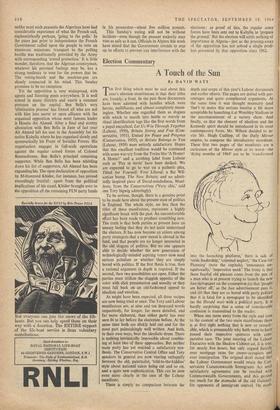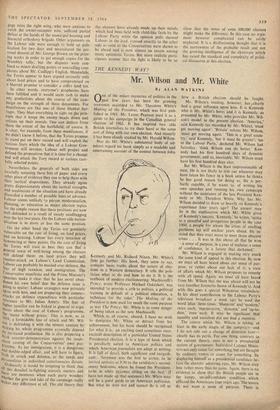Election Commentary
A Touch of the Sun
By DAVID WATT THE first thing which must be said about this year's election manifestoes is that their titles are, frankly, a frost. In the past these documents have been adorned with handles which were heroic, mellifluous, and almost completely mean- ingless. Whether one regarded them as slogans with which to march into battle or merely as ritual identification tags like the first words from a papal encyclical, Let Us Win Through Together (Labour, 1950), Britain Strong and Free (Con- servative, 1951), United for Peace and Progress (Conservative, 1955), or Britain Belongs to You (Labour, 1959) were entirely satisfactory. Hopes that this excellent tradition would be continued with some war-cry from the Tories like 'A Home! A Home!' and a soothing label from Labour such as 'Pax in terris' have been dashed. We are expected to go to war on a pathetic plea, Think for Yourself, Vote Liberal; a flat Wil- sonian bump, The New Britain; and an admit- tedly inspired piece of literal-mindedness, Mani- festo, from the Conservatives ('Very chic,' said one Tory bigwig admiringly).
To be serious, though, there is a genuine point to be made here about the present state of politics in England. The whole style, no less than the titles of these manifestoes, represents a highly significant break with the past. An uncomfortable effort has been made to produce something new. The truth is that both parties at present have an uneasy feeling that they do not quite understand the electors. It has now become an axiom among party strategists that a new mood is abroad in the land, and that people are no longer interested in the old slogans of politics. But no one appears able to decide whether the new generation of technologically-minded aspiring voters now need serious pabulum or whether they are simply bored with politics. If the first thesis is true, then a rational argument in depth is required. If the second, then two possibilities are open. Either the parties must titillate the sluggish appetite of the voter with slick presentation and novelty or they must fall back on an old-fashioned appeal to idealism and emotion.
As might have been expected, all three recipes are now being tried at once. The Tory and Labour manifestoes are, at nine and ten thousand words respectively, far longer, far more detailed, and far more elaborate, than either party has ever seen fit to lay before the electorate before. At the same time both are slickly laid out and for the most part painstakingly well written. And both, in their own ways, beat the idealistic drum. There is nothing intrinsically impossible about combin- ing at least two of these approaches. But neither main party has yet reached a satisfactory syn- thesis. The Conservative Central Office and Tory speakers in general are now veering unhappily between the old, paternalist, 'told-to-the-kiddies' style about national cakes being cut and so on, and a quite new sophistication. This can be seen even more clearly in the case of the Labour manifesto.
There is simply' no comparison between the depth and scope of this year's Labour documents and earlier efforts. The pages are dotted with per- centages and quite complicated arguments. At the same time it was thought necessary (and 'fun') to make this serious treatise a bit more acceptable by launching it at Wembley Stadium to the accompaniment of a variety show. And finally, so that the element of idealism and the Kennedy spirit should be introduced in its most contemporary form, Mr. Wilson decided to in- vite Mr. Hugh Cudlipp, of the Daily Mirror empire, to compose the introductory exordium. These first two pages of the' manifesto are a caricature of the Mirror style at its worst--the 'dying months of 1964' are to be 'transformed
into the launching platform,' there is talk of 'virile leadership,' criminal neglect,' the Case for Planning' (note the capitals), 'announces un- equivocally,' imperative need.' The irony is that these fearful old phrases come, from the pen of a man who is at present trying to launch the new Sun newspaper on the assumption (a) that 'people are better off,' as the Sun advertisement puts it, and (b) that they are so bored with party, politics that it is fatal for a newspaper to be identified (as the Herald was) with a political party. It is hardly surprising that a sense of considerable confusion is transmitted to the reader.
When one turns away from the style and tone to the content of the two main manifestoes there is at first sight nothing that is new or remark- able, which is presumably why both seem to have passed their respective sponsors with com- parative ease. The joint meeting of the Labour Executive with the Shadow Cabinet sat, it is true, for nearly, five hours, but only argued fiercelY over mortgage rates for owner-occupiers and over immigration. The original draft stated that the Labour Government would retain the Con- servitive Commonwealth Immigrants Act until satisfactory agreements can be reached with Commonwealth Governments, and this proved too much for the stomachs of the old Gaitskel- lite opponents of immigrant control. On niort-
gage rates the right wing, who were anxious to catch the owner-occupier vote, suffered partial defeat at the hands of the municipal housing and financial orthodoxy brigade. Other arguments on the Labour side were enough to hold up pub- lication for two days and necessitated the per- sonal descent of Mr. George Brown on the print- ing works in order to get enough copies for the Wembley rally; but the disputes were con- fined to minor drafting points or unavailing com- plaints about Mr. Cudlipp's English. Meanwhile, the Tories appear to have argued seriously only about land prices and to have compromised on a blurred promise to consider a stiffer land tax.
In other words, everyone's prophecies have been fulfilled and it would seem rash to make any predictions about the course of the cam- Paign on the strength of these documents. For manifestoes are like one of those blanket bar- rages. They blast everything in sight on the prin- ciple that it keeps the enemy heads down and softens up their morale. One can deduce from them the extent of the battlefield, of course. It is clear, for example, from these manifestoes, if we didn't know it before, that the Tories propose to stand pat on their record and will exploit the various fears which the idea of a Labour Gov- ernment still invokes. Labour will project and defend the proposition that it is time for a change and will attack the Tory record at various care- fully selected points.
Nevertheless the generals of both sides are carefully scanning these bits of paper and every other piece of evidence they can to help them with their tactical dispositions. They already agree Pretty dispassionately about the tactical strengths and weaknesses of the situation and have already discarded a number of possible lines of advance. Labour seems unlikely to pursue modernisation, Planning, or education as major election topics for the simple reason that these positions are now Well defended as a result of steady sandbagging over the last two years. On the Labour side nation- alisation is in more or less the same position.
On the other hand the Tories are genuinely Vulnerable on the cost of living, on land prices. and on housing. Labour has every intention of hammering at these points. On the cost of living the Tories will trust as best they can that a general sense of well-being among the electors Will defend them; on land prices they will Counter-attack on Labour's Land Commission. Labour can probably be mauled over defence, the fear of high taxation, and immigration. The Conservative manifesto and the Prime Minister's speeches make it clear that he has never aban- doned his own belief that the defence issue is going to matter. Labour strategists now privately agree with him, and are preparing their counter- attacks on defence expenditure with particular reference to Mr. Julian Amery. The fear of higher taxation can be linked in general to argu- Ments about the cost of Labour's programme, the 'menu without prices.' This is now, as in '959, a formidable line of attack and Mr. Wil- son is defending it with the utmost caution by Making his whole programme avowedly depend °,11 increased production. He is also preparing a brisk counter-demonstration against the inade- quate costing of the Conservatives' own pro- gramme. As for immigration, it is a dangerous and double-edged affair, and will have to figure, both in attack and defence, as the needs and Personalities in individual constituencies dictate.
Ordinarily it would be tempting to think that all this detailed in-fighting scarcely matters and there are moments when each party wonders Whether the'give and take of the campaign really makes any difference at all. The old theory that
the electors have already made up their minds, • which had been held with child-like faith by the Labour Party while the opinion polls showed Labour in the lead, crossed smartly to the other side as soon as the Conservatives were shown to be ahead and is now almost an axiom among many optimistic Tories. But more realistic parti- cipants assume that the fight is likely to be so close that the votes of even 100,000 electors might make the difference. In this case no argu- ment however complicated can be safely neglected. It is a disillusioning thought that it is the narrowness of the probable result and not the growing intelligence of the electorate which has raised the standard and complexity of politi- cal discussion at this election.



































 Previous page
Previous page